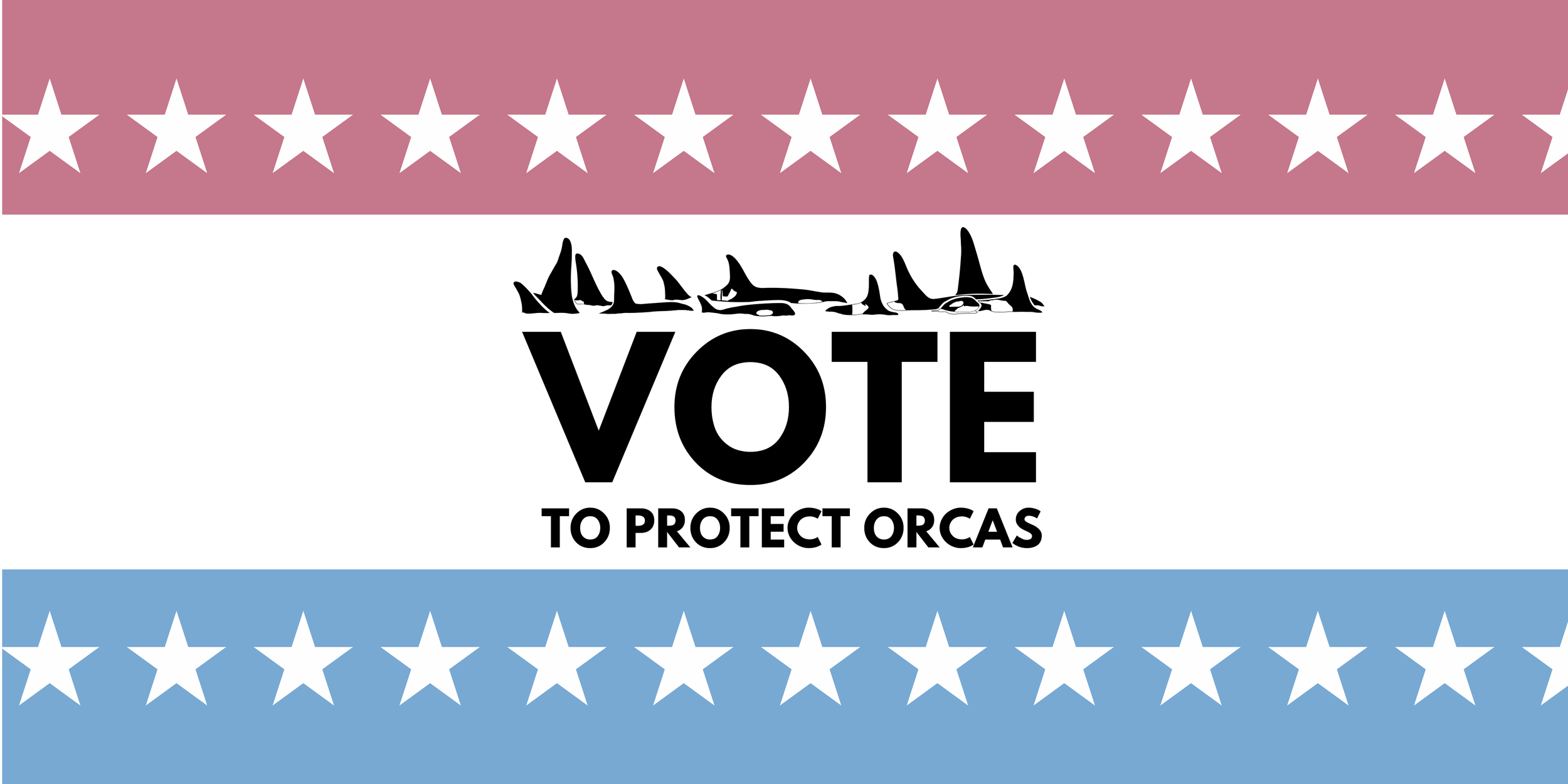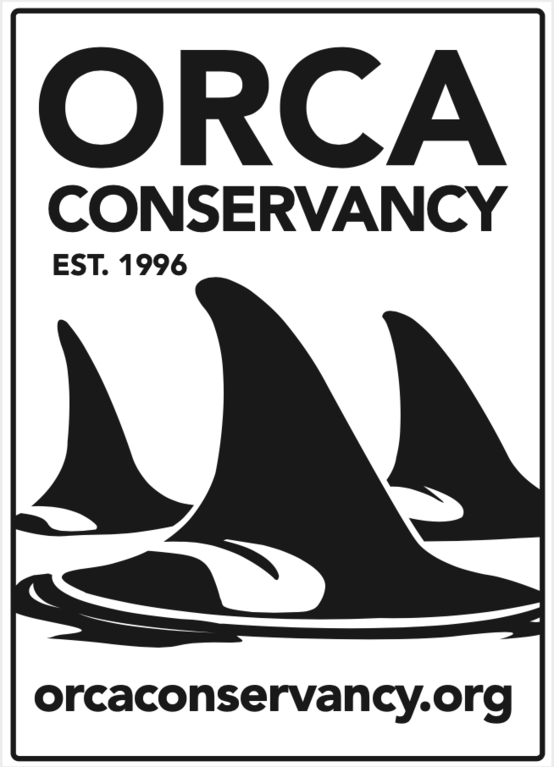
Make a Plan to Vote to Protect Orcas
The critically endangered Southern Resident killer whales are on the brink of extinction. As of today, there are only 73 individuals remaining.
The 2024 Population Census saw the loss of two adult males including L85 Mystery and K34 Cali, as well as the young calf J60 who was less than a month old. After the completed census, a new calf, L128, was born, but sadly is not expected to survive. These losses are a stark reality of the situation, but it’s not too late to help them.
One of the most impactful ways you can help the critically endangered Southern Resident killer whales is to vote. The people and initiatives on the ballot will help shape future legislation like clean water policies, habitat protection, and more. With the upcoming 2024 Elections, it’s time to do your part and vote to help protect orcas.
We have put together this page for you to use as a resource for everything you need to know about initiatives that impact orcas, how to register, and more. So let’s get started!

Table of Contents
Click one of the buttons to jump to a section
Register to Vote
Register to vote, check your registration status or update your voter information
Washington Residents:
Oregon Residents:
California Residents:
Register to vote, check your voter registration status, or update your voter information online here
Voter Registration Deadlines:
Online: October 21st
By mail: October 21st
In person Early Voting: October 7th - November 4th
In Person Election Day: November 5th
Find your local county elections office here
Find a ballot drop box here
Idaho Residents:
Register to vote, check your voter registration status, or update your voter information online here
Voter Registration Deadlines:
Online: October 11th
By mail: October 11th
In Person Early Voting: October 21st - November 1st
In person Election Day: November 5th
Find your local county elections office here
Find a ballot drop box here
For all other U.S. Residents: Visit vote.gov to register and find voter information for your state.

Voter Resources
Additional resources, information, and everything you need to vote this election
Canidates and Ballot Measures:
For in-depth information, voting resources, and personalized ballot information visit VOTE411. Vote411 provides you everything you need based on your address for you to learn about all of the candidates and initiatives on your ballot. They do not save your information, so it’s safe to use. This is a great source for local elections that may have initiatives that support conservation, orca and salmon recovery.
Online Voters’ Pamphlet for General Elections:
WASHINGTON: https://www.sos.wa.gov/elections/voters/2024-general-election-voters-guide
OREGON: https://oregonvotes.gov/voters-guide/english/votersguide.html
CALIFORNIA: https://voterguide.sos.ca.gov/
Voter Rights:
As a registered voter and a United States Citizen, your right to vote is protected.
Make sure you know your rights. For more information, you can download the Department of Justice Civil Rights Division Know Your Rights Voting Guide.
The American Civil Liberties Union, or ACLU, also has resources to help you exercise your voting rights, resist voter intimidation, and access accommodations for disabilities and language assistance. Click here to learn more.
Frequently Asked Questions:
-
Even if you aren’t a resident of Washington, Oregon, California, or Idaho, you can still help.
Vote for policies and representatives who support environmental protection. The ecosystem is all connected, so what will help the environment in your own community will help the global community.
-
There were no initiatives on this year’s election that we identified that would impact orca recovery.
You vote still matters! The leaders you elect can help shape important policy that will impact orcas, so be sure the candidates you vote for have values that align with your own and support conservation initiatives, as these will assist in orca recovery.
Be sure to check the Voter Resources page and VOTE411 to learn about initiatives for your local elections that may not be covered on the State level.
-
Orca Conservancy is a registered 501(c)(3) nonprofit, and as such we are not allowed to support or oppose any candidate for public office.

Washington Initiatives
Learn about the Washington State initiatives on the ballot and how they impact orcas and salmon recovery
Initiative Measure No. 2066
This measure would repeal laws and regulations that promote electrification and discourage the use of natural gas.
Orca Conservancy’s Stance: Vote No
Initiative No. 2066 Explained:
Earlier in the year the Washington State Legislature passed the “Washington Decarbonization Act”, a law that regulates Puget Sound Energy (PSE) and requires them to report and forecast customer energy demand and provide proposals to reduce greenhouse gas emissions. As part of the law, PSE must include a plan on how it will transition from natural gas to electricity in a cost-effective way. This plan must be submitted and approved by the Washington Utilities and Transportation Commission (UTC), which will then determine whether or not the plan meets energy efficiency targets at a reasonable cost to customers.
The Decarbonization Act also requires PSE to educate customers about the benefits of switching to electricity and the availability of incentives or rebates for electrical appliances which can help customers save money while reducing carbon.
If Initiative Measure No. 2066 is approved it will repeal or amend the Decarbonization Act, which will roll back efforts to transition Washington State to clean energy. 2066 will weaken the Clear Air Act and threaten health protections against harmful air pollution. Additional concerns of 2066 include the risk of increasing energy bills to consumers, rolling back modern standards to keep homes and businesses energy efficient, and preventing local communities from making decisions that work best for them.
How this Initiative Impacts Orca Recovery:
One of the biggest threats impacting the critically endangered Southern Resident killer whale population is lack of food. Their main food source of Chinook Salmon is on the decline due to diminishing habitat, warming water temperatures, dams, and overfishing. Climate Change compounds these issues and poses a major risk to salmon survival, and therefore orca recovery.
Warming temperatures cause the rise in water temperatures which can cause harm and be lethal to salmon. Warmer water has less oxygen and fewer nutrients and can cause salmon physical stress. Prolonged exposure of salmon to warmer water temperatures can cause an increase in metabolic rates and cause nutritional stress, lower spawning success, and exacerbate disease and parasite loads. Water temperatures above 72°F are lethal to salmon.
The health of the river systems that salmon depend on is also at risk due to rising temperatures. In the Spring the snowpack accumulated from the winter begins to melt feeding the rivers which help salmon travel upstream to spawn. The snowpack also helps to keep rivers cool which salmon need to survive. The problem that is beginning to happen more frequently is those warm winters that produce little snowfall keep rivers shallow causing the already warm water temperatures to heat up faster while also making travel in the rivers more difficult and sometimes impossible with lower water levels and causing salmon to be more susceptible to prey decreasing their chances of spawning.
Initiative 2066 will exacerbate these issues by rolling back the clean energy transition that will help reduce carbon in the atmosphere that leads to global warming.
Initiative Measure No. 2117
This measure would prohibit state carbon tax credit trading and repeal legislation of a cap investment program to reduce greenhouse gas emissions.
Orca Conservancy’s Stance: Vote No
Initiative No. 2117 Explained:
In 2021 Washington enacted the Climate Commitment Act which created a cap-and-invest program to reduce greenhouse gas emissions. The program sets an emissions limit, or cap, on greenhouse gas emissions and then lowers that cap over time to ensure Washington meets greenhouse gas reduction goals. Under the Climate Commitment Act, large polluters are required to lower their carbon emissions or pay for “allowances” to cover their emissions.
Allowances act as a permit that allows businesses to emit certain amounts of greenhouse gases. If they exceed their allowances they are required to buy more. They are also allowed to sell their surplus allowances for profit, which incentivizes them to reduce emissions.
Under this program, large emitters are required to report their greenhouse gas emissions and submit their allowances. Failure to comply results in fines of up to $50,000 per violation a day.
Revenue generated by allowances and penalties are appropriated by the Legislature and must be invested in climate projects throughout the state such as clean energy projects, community programs, and other initiatives. This in turn creates jobs and stimulates the economy, providing financial benefits to various sectors as well as encouraging companies to reduce emissions over time which will help long-term environmental protection efforts.
If approved, 2117 will repeal the Climate Commitment Act and bar the state from implementing carbon tax trading programs which will result in less funding for conservation projects.
How this Initiative Impacts Orca Recovery:
Initiative No. 2117 poses a risk to the critically endangered Southern Resident killer whales primarily due to its potential impact on the environment and the availability of their main food source, Chinook salmon. 2117 will lead to higher greenhouse gas emissions, and allow certain industries to continue or expand operations without necessary restrictions and regulations increasing the threat of climate change and negatively affecting marine ecosystems.
Southern Resident killer whales rely heavily on Chinook salmon for their diet. Climate change can alter salmon habitats, reduce spawning success, and lead to population declines, making it harder for the whales to find enough food. Initiative 2117 will result in higher emissions which can lead to poor water quality and increased temperatures in rivers and coastal waters, further stressing salmon populations and disrupting their life cycles. The initiative could promote land and water use changes that lead to habitat degradation for both salmon and whales, further threatening their survival.
Repealing the Climate Commitment Act will also decrease funding for vital conservation projects that help protect the environment and recovery efforts for both salmon and orcas.
Overall, the risks posed by Initiative 2117 could exacerbate the challenges facing Southern Resident killer whales, potentially leading to further declines in their already vulnerable population.

California Propositions
Learn about the California State Propositions on the ballot and how they impact orcas and salmon recovery
Proposition 4
Authorizes the state to borrow $10 billion to fund projects aimed at safe drinking water, wildfire prevention, clean air, and protection of natural resources.
Orca Conservancy’s Stance: Vote Yes
Proposition 4 Explained:
Proposition 4, also called the “Water Infrastructure and Watershed Protection Bond”, would allow the state to borrow $10 billion in bonds to make urgent investments that will help to enhance the state's water management systems and infrastructure. The initiative focuses on addressing critical water needs in California by providing funding for various projects that improve water supply, quality, and conservation. This includes investments in infrastructure to support clean drinking water, flood protection, and ecosystem restoration.
One of the key goals of Prop 4 is to modernize California's aging water infrastructure, ensuring that communities have reliable access to water. The measure emphasizes sustainability and resilience, particularly in light of the challenges posed by climate change, such as droughts and extreme weather events. By prioritizing projects that enhance water storage, conveyance, and treatment, the proposition seeks to secure California's water future.
Additionally, Proposition 4 recognizes the importance of protecting California's natural resources, including watersheds and habitats. By funding restoration projects, the initiative aims to support biodiversity and enhance ecosystems that are vital for the health of both wildlife and human communities.
How this Proposition Impacts Orca Recovery:
Prop 4’s focus on water quality and infrastructure improvements will assist in orca recovery efforts to sustain salmon populations, which are crucial for the Southern Residents’ survival by enhancing habitat conditions and promoting ecosystem health. Enhanced water infrastructure can lead to better water quality in rivers and streams while Investments in restoring natural water flows and habitats can create healthier ecosystems for fish populations, aiding recovery efforts.
While California is not yet considered part of the Southern Resident killer whales’ designated habitat, the Residents travel to California waters on occasion, specifically K and L pods, to seek out salmon stocks especially when food in their primary habitat (Washington State and British Columbia) is scarce. California waters are important for their feeding and migratory patterns and they likely prey on various California salmon stocks including Sacramento River fall-run and spring-run Chinook salmon, Klamath River Chinook, and Central Valley Chinook.
The initiatives on Prop 4 will lead to improvements in salmon habitat and populations which will provide a more reliable food source for the whales. Prop 4 also aims to mitigate the effects of climate change and improve the health of the ecosystem through improved water infrastructure which will lead to healthier river and coastal ecosystems which will benefit both orcas and salmon.

Make a Donation
You can further support orca recovery efforts by making a donation. Your tax-deductible contribution will help make our work possible. Learn about projects and how we are working to recover the critically endangered Southern Resident orcas.





